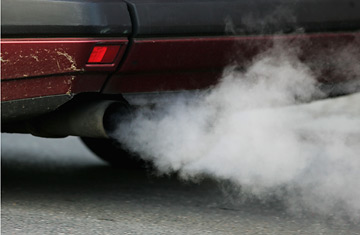
A vehicle's exhaust pipe releases fumes
Europe likes to think of itself as the custodian of the world's environment, and its policies to cut back strongly on its own harmful emissions have set a powerful example in the fight against climate change.
But although there are some sacrifices E.U. governments are prepared to make for Mother Nature, on Wednesday they were presented with one that truly tested their environmental mettle.
It came in the form of European Commission plans to fine carmakers if they fail to meet their emission targets. The proposals could slap annual penalties worth billions of euros on carmakers if they miss targets. The measures are the latest weapon to force them to slash new vehicle emissions from the current level of about 158 grams of carbon dioxide (CO2) per kilometer to 120g/km by 2012. Penalties will start in 2012 at €20 euros ($28.80) per gram of CO2 over the target, and will grow to €95 ($136) in 2015.
"Passenger cars account for about 12% of overall E.U. carbon dioxide emissions and emissions from transport are continually increasing," said E.U. Environment Commissioner Stavros Dimas. "The aim of the legislation is to reduce CO2 emissions from cars in order to help fight climate change."
The proposals come just days after a U.N. agreement in Bali on the next stage of global climate change negotiations after the Kyoto Protocol expires in 2012. The E.U. executive says that if Europe is to stake a credible claim for leadership on climate change, it will have to show serious resolve in cutting car emissions, the main gas blamed for global warming.
But even before they were announced, carmakers, and Germany and Sweden's governments (nations known for producing larger cars), were already squealing that this was a step too far.
German Chancellor Angela Merkel has made her views clear by claiming it was "not economically favorable." The Chancellor believes the move would burden Germany and its carmakers.
The European Automobile Manufacturers Association says the industry is already making huge investments to meet green targets. "It is unrealistic to believe this can be done by 2012," said ACEA president Sergio Marchionne. "The announced legislative framework will not be ready before 2009: this leaves the industry too little time to apply by 2012; the cars of 2012 will be on the drawing table tomorrow." The group also points to studies, including the Stern report, which suggest that vehicle technology is one of the least cost-effective ways of bringing down CO2 emissions from transport.
German carmakers like BMW, Mercedes-Benz and even Volkswagen (through its subsidiary Audi) dominate the European market for high-performance, luxury vehicles. They resent being blamed for global warming, and say it is unfair that they have to bear the lion's share of cuts to meet greenhouse gas targets. A spokesman for BMW said, "Premium manufacturers are being disproportionately burdened and makers of small cars have to do little." Volkswagen called the penalty regime an "unacceptable burden."
Indeed, the pressure group Transport and Environment (T&E) says emissions from German carmakers were, on average, 173g/km in 2006, compared to an average of 144g/km for French and Italian cars.
However, while French and Italian carmakers cut their average emissions by 1.6 percent between 2005 and 2006, emissions from German cars actually increased by 0.6 percent. "Germany's fine automotive engineers should be focusing on making cars leaner and more fuel efficient," said T&E director Jos Dings. "Sadly, based on recent progress, they mostly seem to be intent on building ever heavier, larger and more gas-guzzling cars that simply don't belong in the 21st century."
The car industry employs 2 million Europeans and indirectly supports another 10 million in related industries. Europe is clearly a key world player: of the 46 million passenger cars produced globally, 38% are made in the E.U.
But T&E says transport is the worst-performing sector under the Kyoto Protocol, and transport CO2 emissions in the E.U. grew by 32% between 1990 and 2005 while other sectors reduced their emissions by 9.5% on average over the same period. The group also believes some carmakers are making progress: Fiat has already met a target voluntarily adopted by the industry, to bring emissions down to 140g/km by 2008. Citroen and Europe's second largest carmaker, Renault, are on track to meet this target and Ford and Peugeot are not far off either.
The Commission announced back in February that carmakers should cut CO2 emissions to 130g/km through improvements in vehicle motor technology by 2012, with the further reduction of 10g/km to be achieved by additional measures like using biofuels, improving tire performance, and developing less intensive air-conditioning systems.
But before the measure becomes law, expect intense lobbying of E.U. ministers from one of Europe's most powerful industries — and its richest economy, Germany — as they try to put the brakes on the potential impact of the emission penalties.
